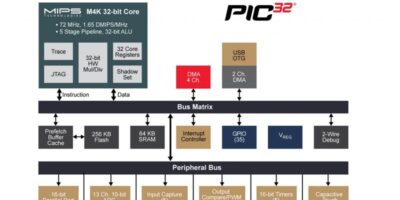Microchip introduces PIC32 family to migrate to longer battery life
The latest family of eXtreme Low power (XLP) technology 32-bit microcontrollers (MCUs) has been announced by Microchip.
The PIC32MX1/2 XLP family offers current PIC32MX customers an easy migration path for higher performance at much lower power, says Microchip. This enables both increased functions and longer battery life in portable applications. The PIC32MX1/2 XLP family increases performance in small pin-count devices with little code rework for existing customers, adds Microchip.
Microchip’s XLP technology is designed for wearable technology, wireless sensor networks and other smart connected devices. It offers low current operating modes for run and sleep modes, where extreme low-power applications spend 90 to 99 per cent of their time. XLP technology will enable sleep and deep sleep shutdown states on the PIC32MX1/2 XLP devices, enabling deep sleep currents of down to 673nA. The devices offer over 40 per cent higher performance than Microchip’s existing PCI32MX1/2 portfolio, while reducing average run currents by 50 per cent.
There is a range of memory configurations for the PIC32MX1/2 XLP family, namely 128/256kbyte flash and 32/64kbyte random access memory (RAM) in packages ranging from 28 to 44 pins. The PIC32MX1/2 MCUs also include a set of peripherals such as I2S, for digital audio, 116 DMIPS performance for executing audio and advanced control applications, a 10-bit, one Msample/s, 13-channel analog to digical converter (ADC) and serial communications peripherals. The PIC32MX2 series also supports universal serial bus (USB) device, host and on-the-go (OTG) functionality.
In addition to the hardware peripheral features, the PIC32MX1/2 series is supported by Microchip’s MPLAB Harmony Software Development Framework, which simplifies development cycles by integrating the licence, resale and support of Microchip and third-party middleware, drivers, libraries and real time operating systems (RTOS). Microchip’s readily available software packages such as Bluetooth audio development suites, audio equaliser filter libraries, decoders (including AAC, MP3, SBC), sample rate conversion libraries and USB stacks are designed to reduce the development time of digital audio, consumer, industrial and general-purpose embedded control applications.




